
|
|
|
|
|
|
CONTACT US |
|

 |
|
||||||||||||
 |
|||||||||||||
|
|
On November 21st 1939, 17 year old Charles E. Johnson of Belmar, New Jersey enlisted into his local National Guard Unit. While on maneuvers in the Pacific Northwest he saw a flier advertising for men who were interested in joining the Army's new airborne units that were being formed. Charlie and a friend enlisted in the Regular Army so they could join the airborne. In early 1943 he began his jump school training at Fort Benning, Georgia.
The following are excerpts from a tape recording Charlie made for his family; “We all knew we were going to war eventually. So my buddy and I figured we better enlist into a ‘crack’ outfit and surround ourselves with good men if we were going to go to war."
“The training was grueling. But we were tough and there wasn’t anything they could hand out to us we couldn’t handle. For at least 3 months, until they finished building the Jump School, all we did all day long was exercise."
On April 29th 1943 the Regiment sailed for North Africa. After almost 2 months of training in the desert, Charlie made his first combat jump on the night of July 9th 1943 into Sicily.
The pilots flying the planes were generally new and inexperienced at dropping troops into a combat situation, many drops were scattered all over. Some of the 505th did hit their drop zones ok, Regimental headquarters company, 1st battalion headquarters company, and A company were among those that did. The 505th was the spearhead for the assault. The 505th was also involved in the Battle for Biazza Ridge, Sicily.
“They scattered us all over hell. A few sticks were dropped into the sea, but, strange stuff like that happens in war. War is organized chaos. I’m just glad it wasn’t us.”
September 14th 1943. The 505th jumped on Paestum, Italy, in support of General Mark Clark's 5th Army beach landing at Salerno, Italy. On October 1st 1943 the 505, with a British recon unit, liberated Naples. The 505 occupied and policed the city until mid November 1943. This was Charlie's 2nd combat jump.
“It was awful watching otherwise decent mothers prostituting themselves to feed their families. Such are the misfortunes of war.”
“I always seemed to land in nice soft places in combat jumps. Never got wounded either, thank God! We were marching down a street in Naples, and an artillery shell landed not too far from us. I was walking between two other guys, one on either side of me, and both those guys got hit with shrapnel, and I was never touched. I was a lucky son-of-a-bitch! Someone was lookin’ over me."
November 18th 1943, the 505th boarded the USS Frederick Funston docked in the harbor of Naples, Italy bound for Belfast, Northern Ireland. We disembarked at Belfast, and were billeted in Cookstown, Ireland until February 13th 1944. We moved to Quorn, Leicester, England and began training for the invasion of Europe. A few days before D-Day the 505th was moved again to Spanhoe and Cottesmore airfields in preparation for the Normandy Invasion. During the 3 months the 505th was in Quorn, Charles meets Joyce Pringle in Loughborough, and they begin dating. Shortly before Charles and the 505th are moved to the airfields, Joyce discovers she’s pregnant with her first child...a son, John.
“Yeah, our regiment was quarantined before the invasion and forced to stay in policed areas unable to come or go for security purposes. So I’d get thrown into the stockade on purpose, because we knew there was a hole in the stockade fence that we could sneak out through at night and go to town. When they discovered we were doing this, they fixed the hole. I didn't know they fixed the hole and got thrown into the stockade when the hole was no longer there. So, my best friend and squad leader, “Tiny” Horvath, and my future wife, Joyce Pringle, got-together when I was in the stockade, and the two toured all the pubs in Loughborough with a baby buggy which carried a large bottle in the seat. They would dispense a shot or two at each pub into the bottle. This continued until the bottle was full. Then they pushed the baby buggy with the full bottle to the stockade and threw the bottle over the fence so me and the boys could enjoy our stay in the stockade. Me, Joyce and Tiny would sit at the fence and gab and laugh until daylight. Hell, we enjoyed ourselves as much as possible before we got the call to go. It could have been our last days alive together. Tiny and my wife's escapade with the baby buggy, was the 'talk of the town' the next day.”
“It was something being part of the Normandy Invasion. Everybody knew it was ‘big’, and history-making. The fervor that led up to the invasion was memorable. It was hard not to catch the frenzy. And you could tell everyone, up and down the ranks, were resolved – within themselves – to do their best….cause they knew it was big. We all figured that we weren’t coming home in one piece.”
Late evening of June 5th 1944 the 505th boarded C-47 planes and jumped on St. Mere Eglise, Normandy, France, at 0130 hrs on June 6th, 1944. Some of the 505th's 3rd Battalion land in the town proper, with others in the unit scattered around the towns outskirts. Charles lands roughly a quarter-mile outside of the town. As a result of the 505th’s efforts, St. Mere Eglise is the first town liberated by the Allied forces in Europe. The 505th was awarded a Presidential Unit Citation for their distinction at St. Mere Eglise. Charles’s efforts were also recognized as he was awarded the first of 3 Bronze Star medals for his efforts there. The 505th also participated in liberating other surrounding towns in Normandy, and participated in the attacks on hills 95 and 131. This was Charlie's 3rd combat jump.
| Official Bronze Star Medal Citation
“Private Johnson, Headquarters Company, Second battalion, on 7 June 1944, one-fourth mile northwest of St. Mere Eglise, France, continued to man his mortar in face of heavy enemy attack which reached within 200 yards of the mortar position. Although the position was covered by heavy enemy automatic and rifle fire, Private Johnson continued to fire his mortar effectively, an act which contributed materially to the repulse of the enemy attack.” signed: M.B. Ridgway, Major General, US Army, 82nd Abn Div, Commanding. |
“We couldn’t wait to get off those planes. When that thing ( C-47 ) took off, it use to shake, rattle and roll like a sonuvabitch. Every bolt and nut on that plane use to rattle. It felt like the plane was going to fall apart in mid-air. Then, while in flight over the peninsula, we’d look out the port holes and see planes goin’ down left and right of us, and we were just chompin’-at-the-bit to get out of those godamned things, cause we felt safer on the ground in enemy territory.”
“Normandy was a bastard! Our pilots were experienced and we hit our drop zones. We had the same pilots throughout the war, so that helped our regiment hit those drop zones. Everyone else, the glider-riders and the 101st, were scattered all over hell. Glad I didn’t land in St. Mere Eglise though. Our boys took a beating there.”
“In Normandy, I ran into a German soldier as we both came eye-to-eye with one another. We both had our pistols drawn and cocked. He had his luger and I had my 45. We both stopped and looked at one another for a moment, and then we both turned and ran in the opposite direction. That’s the way it is sometimes in combat. The Germans ( the Wehrmacht ) were regular guys like us. Now the SS, that’s a different story. We all wanted to kill those bastards.”
“I remember in Normandy we were battling through the hedgerows and between the hedgerows were narrow dirt roads. There were a number of dead laying in the road. I remember tanks coming down the road, moving fast on the attack, and their tracks were crushing the dead as they moved on the road. I still recall from time to time the sights and sounds of that terrible image….the loud sound of skulls popping – like the sounds of sticks breaking – and the dead bodies getting mangled and twisted and caught up in the tracks of the tanks, greasing the treads with their body parts and blood. But, the tanks had nowhere else to go and couldn’t stop for the dead. It was just an awful sight.”
On July 13th 1944, the 505 returned to Quorn, in the English Midlands. Charles and Joyce were married in Loughborough on August 31st 1944. General James Gavin assumes command of the 82nd Airborne Division, having previously commanded the 505th PIR. These days were a welcome respite from the rigors of combat and was a well-deserved period of rest and relaxation for the men of the 505th.
“The British soldier is the coolest fighting soldier in the world. These guys don’t get rattled over anything. They’re very cool under pressure.”
“We jumped at a 300’ altitude in combat jumps, so if your main chute didn’t open, you didn’t have time to deploy your reserve chute. We use to chuckle when they issued reserves to us before the jumps, cause we just pulled the chutes and stuffed them with other items. Same with our helmets. We’d throw them off and an officer would come by and tell us to get our helmets back on, and as soon as he left, we’d throw them off again. We liked the British berets.”
September 17th 1944. The 505th PIR jumped on Groesbeek, Holland with other allied airborne forces in the largest daylight airborne assault in history at 1300 hours. Their objective was to take and secure the bridge over the Waal River in Nijmegen, (aka: the Nijmegen Bridge ). This allied attack was depicted in the movie, “A Bridge Too Far”, starring Ryan O’Neil as General Gavin. The 505th also received it’s 2nd Presidential Unit Citation for their distinction in this battle. While the riflemen were battling forward towards the bridge, mortar squads were supporting their movements with mortar fire based in a cemetery high above the town. This was Charlie's 4th combat jump. He was awarded his 2nd Bronze Star medal in Holland.
| Official Bronze Star Medal Citation
Charles E. Johnson, 20225822, "Private First Class, 505th Parachute Infantry. For meritorious service in Nijmegan, Holland. Private First Class Johnson was a mortar gunner with Headquarters Company, 2nd Battalion, 505th Parachute Infantry, during the attack on Nijmegen. He kept his gun firing incessantly all night and most of the next day. The accuracy of his fire was demonstrated by his skill in laying fire on enemy troops about fifty yards to the front of the mortar OP. He kept the enemy down and denied them observation until the river assault was launched. Due to this excellent performance by Johnson, the assault was conducted with a minimum of casualties. The riflemen caught numerous enemy still in their foxholes and trenches. By his heroic action he was of great assistance to the successful attack on the bridges spanning the Waal River." signed: James M. Gavin, Major General, US Army, Commanding. |
“In Nijmegen, there was a German 88 at the approach to the bridge our boys were fighting to capture. My FO ( forward observer ) called me on the field phone and told me the gun was raising hell with the rifle boys down there. So I told him to guide me into him and we’d take him out. The FO kept giving me corrections to zero-in on that bastard. Shell-by-shell we got closer and closer, and then we hit it! And I remember my FO shouting through the phone, ‘Charlie, ya got’em! You got’em!’. And then I rained down holy hell on that last coordinate and gave them everything I had. We dropped mortars on them as fast as we could load them until my FO told me, ‘that gun’s done, Charlie’.
"During the (Waal) river assault, I kept firing my mortar until the barrel was red hot. The barrel was literally red. We had to let it cool down until it wasn’t red anymore or risk detonating our mortars inside the barrel. But, we knew the boys needed us, so we just kept firing that baby. It was a bastard in the graveyard though. German 88’s would hit those tombstones and marble would be flying everywhere. Then the artillery shells would explode on fresh graves, and the stink from the rotting bodies was sickening. Slim Jim came by in the company of some big wigs afterwards, and asked us how we were holding out. He asked us if we had enough cigarettes and the like and then he told us that we were the best damn mortar squad in the whole damn army….and to keep up the good work. He was a man’s man, Gavin was…a soldier’s General…helluva man."
November 12th 1944. The 505th was redeployed from Holland to France for a short stay in mid November, but on December 18th 1944 were immediately called back to aid the allies in Belgium to counter the German Offensive through the Ardennes Forest, in The Battle of The Bulge. The 505th initially took up defensive positions along the Salm River from Trois Pont, to Grand Halleux, Belgium. The 505th then moved forward to cross the Siegfried Line and up to the Elbe River into Germany. Charlie was awarded his third Bronze Star medal for the battle of Trois Ponts, Belgium.
| Official Bronze Star Medal Citation
Charles E. Johnson, 20225822, Corporal, 505th Parachute Infantry. For heroic conduct in action on 21 December 1944 near *** Belgium. The enemy’s advance had exposed the mortars to direct fire from the enemy’s machine gun and had set the ammunition truck on fire not thirty feet away which threatened to explode at any moment. Corporal Johnson, with complete disregard for his own personal safety, directed the fire of his mortar with devastating effect on the enemy. As a result of Corporal Johnson’s actions, the battalion was able to withdraw with a minimum of casualties. His exemplary conduct was in keeping with the highest traditions of the United States Airborne Forces…" signed: James M. Gavin, Major General, US Army, Commanding. |
“Never been so cold in my life. It was so cold in fact we had to sleep under make-shift shelters in waist deep snow nearly nude in our underwear. Each man would strip themselves and use their clothes as body cover ( blankets ) and then we’d spoon together in the nude under all of our clothes. Each man would take his turn on the outside of the group, where it was coldest. There was no room for sexual bullshit; cause we were literally freezing to death. We’d have to get up a lot and jog in place to get our blood movin’. It was pure hell and the godamndest cold I ever felt.”
“In the Bulge, the German’s were forcing us to withdraw, but me and my squad didn’t know it. We just kept firing the mortar until we realized the German infantry was directly in front of us, and we saw our rifle boys running past our position towards the rear of us. We didn’t have time to pick up our equipment so we just kept firing the mortar, and for some reason the German infantry just stopped. The German’s set an ammo truck near us on fire, but again, we didn’t have time to think about it because they were right in front of us. We really didn’t have any other option but to sit there, fire the mortar, and take our chances. We were just lucky their infantry stopped.”
“I remember when we were on dead detail once, and we were walking around the dead for two days cleaning up the battlefield. We walked around this one guy lying on his back, with his intestines spilled-out on the ground between his legs. He must have caught a piece of shrapnel between the legs in his groin area. We all thought he was dead. For at least a day we walked around him, and then I happened to look at him for a second, and noticed his eye move. The sonuvagun was still alive. So, I called for a medic to come and they determined that he was still alive, and they carted him off to a hospital somewhere. I don’t know if he lived or died after that. Never did follow-up on his whereabouts, condition or anything…He probably died, but I don’t know.”
“When we crossed into Germany, it seemed the entire German army was giving up ( the German 21st Army surrendered to the 82nd –150,000 men ). At this point everybody had tears running down their faces. Tears of joy, relief, whatever, but we knew the war was near an end when they were giving up like this. It was a helluva moment that I’ll never forget.”
Charlie, a high point veteran (ASR score) was honorably discharged in July of 1945. After the war he worked at a civilian job for several years . During this period, his wife Joyce and son, John, who was born in England, emigrate to New Jersey aboard the Queen Mary. In 1948 Charles re-enlisted as a Sergeant into the 82nd Airborne Division. He rose to the rank of 1st Sergeant and retired from the Army in March of 1955. Charles and Joyce (Pringle) produced 7 children ( 4 boys and 3 girls). They lived and worked in the Syracuse, New York area most of their married lives. They were always very proud of the fact that all 4 of their boys served in the United States Armed Forces. Two of their sons, Daniel & Michael served in the Army Airborne ( 82nd / 173rd). One son served in the Air Force (John ), and the other son served in the Navy ( Charles Jr ). Charles Sr. passed February 26th, 1996 in Syracuse, New York.
(Pictures and bio are courtesy of Mike Johnson, Charlie's son, who also served
in the 505th Parachute Infantry Regiment, 2nd Battalion, from 1976 to 1979. )
Private Charlie E. Johnson in Sicily 1943.
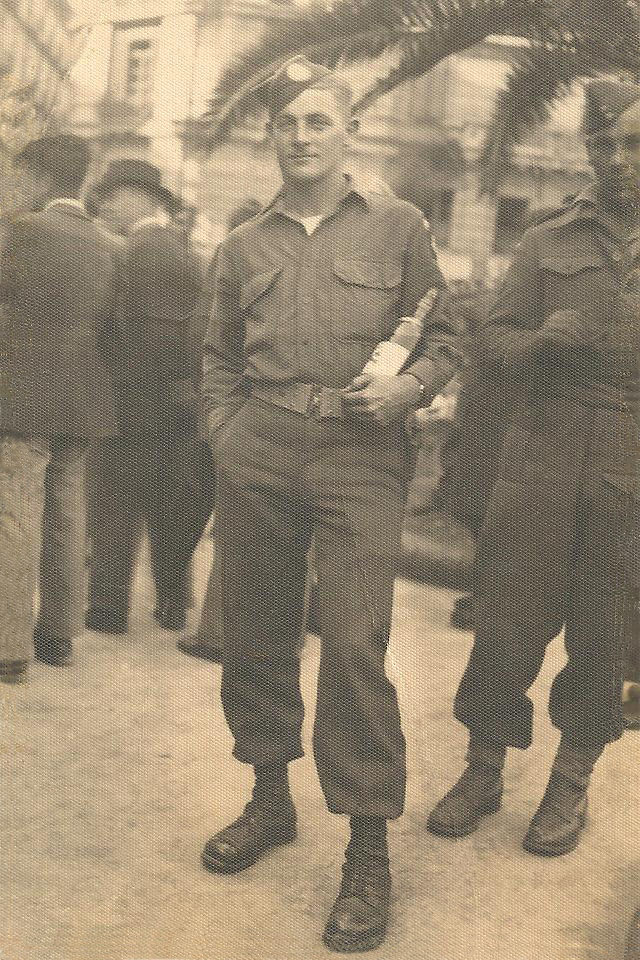
Joe "Tiny" Horvath and Charlie in Sicily 1943.
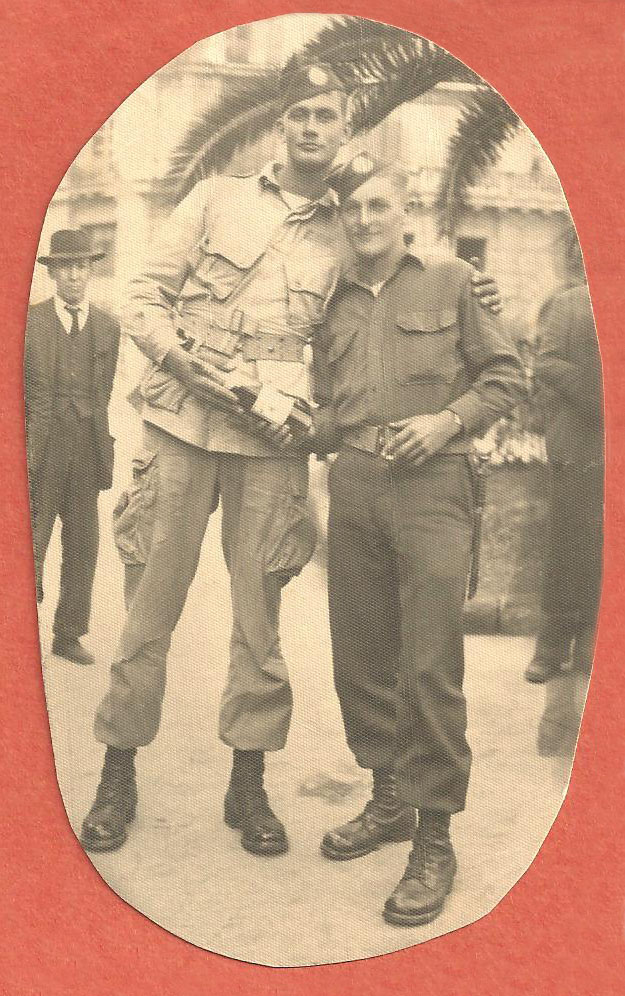
2HHC Mortar Platoon in this 1944 photograph taken in Quorn, England. Notice their mascot, held by the platoon's Lieutenant kneeling front. Joe Horvath is second in from the left side front row. Charlie E. Johnson is third in from the left side in the front row. (On the right side of Joe) Two of the paratroopers have their CIB's on their left pockets, and many more have their Presidential Unit Citations over their right pockets.
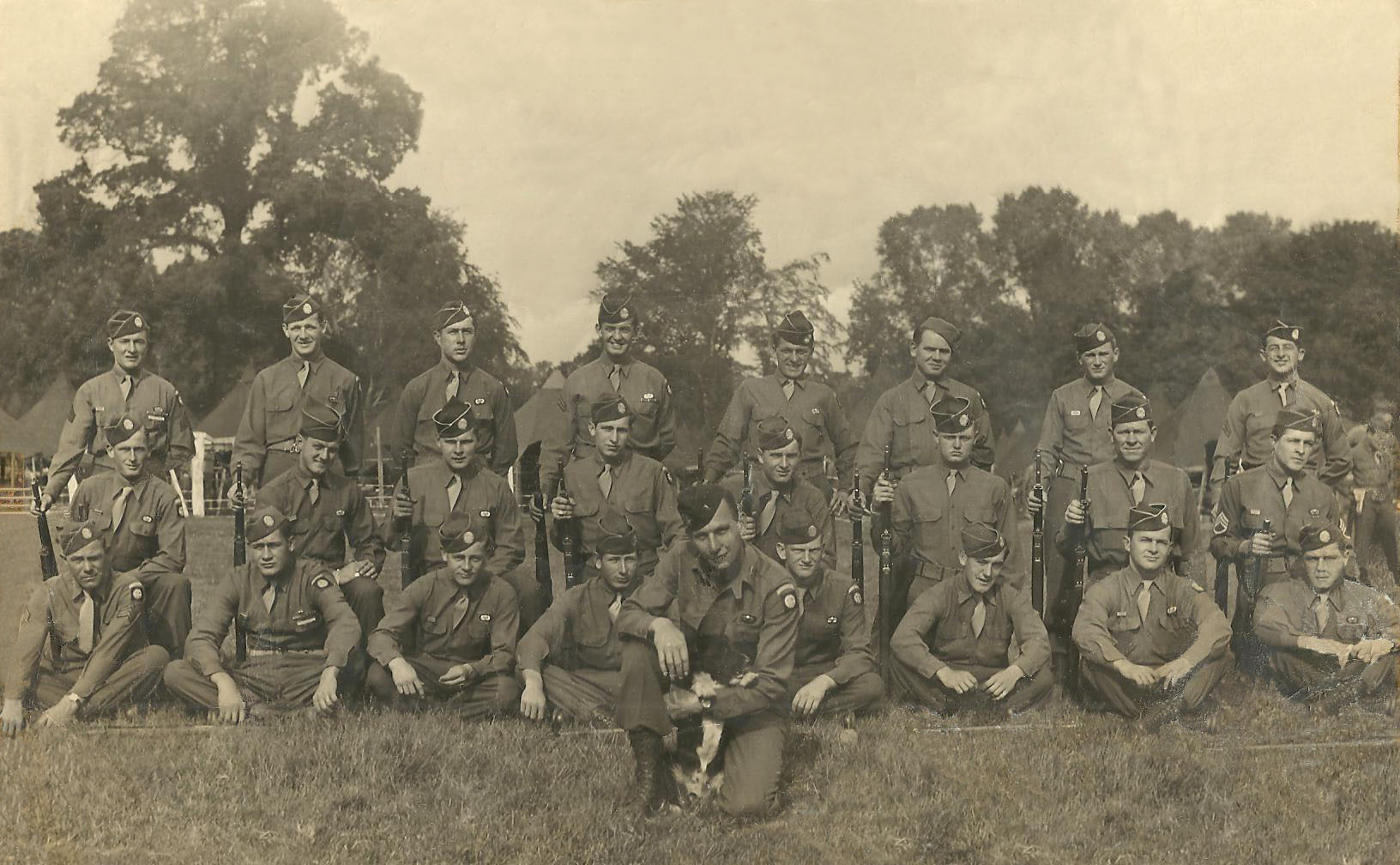
Private Johnson and Joyce Pringle's wedding reception at the Unicorn Pub, Loughborough, England - August 31,1944.
Charlie is on Joyce's left side.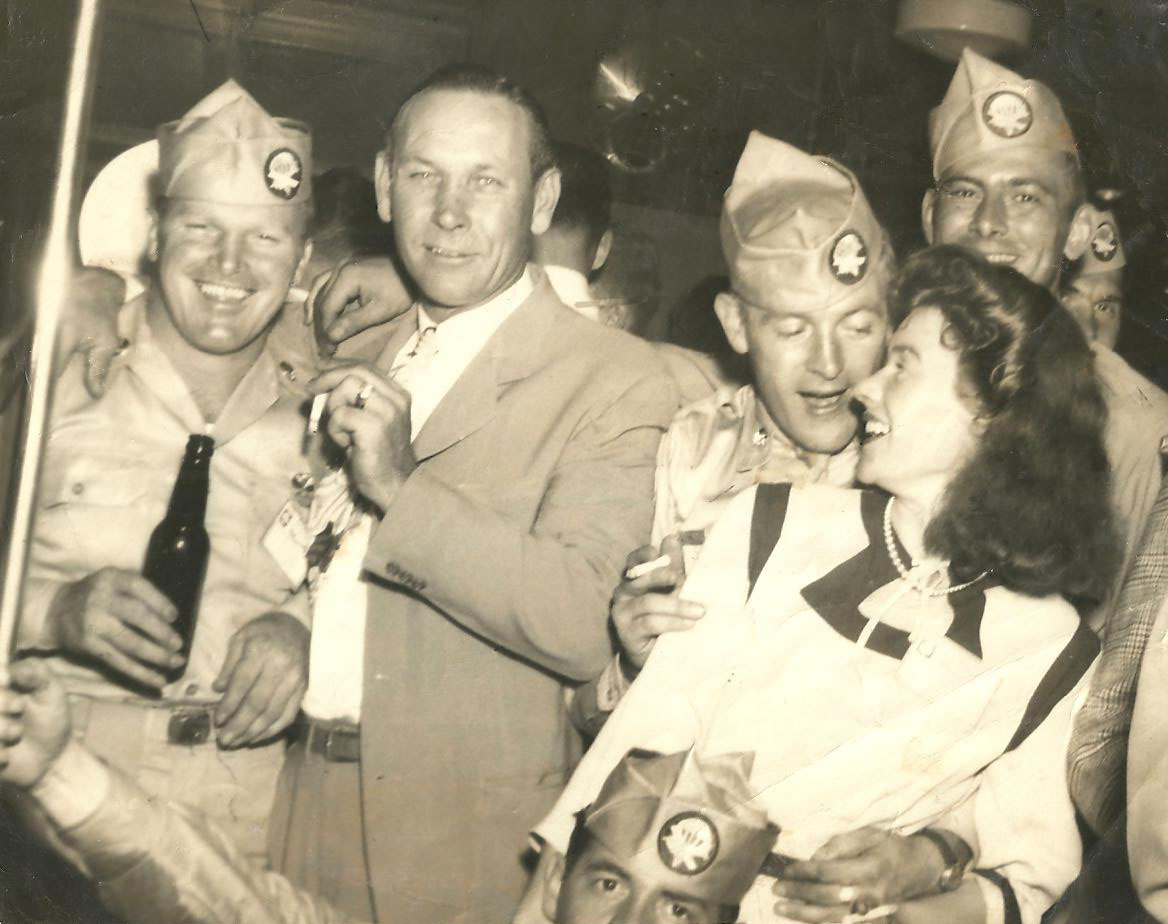
Charlie (bottom right) and Joyce's wedding reception at the Unicorn Pub, Loughborough, England - August 31,1944.
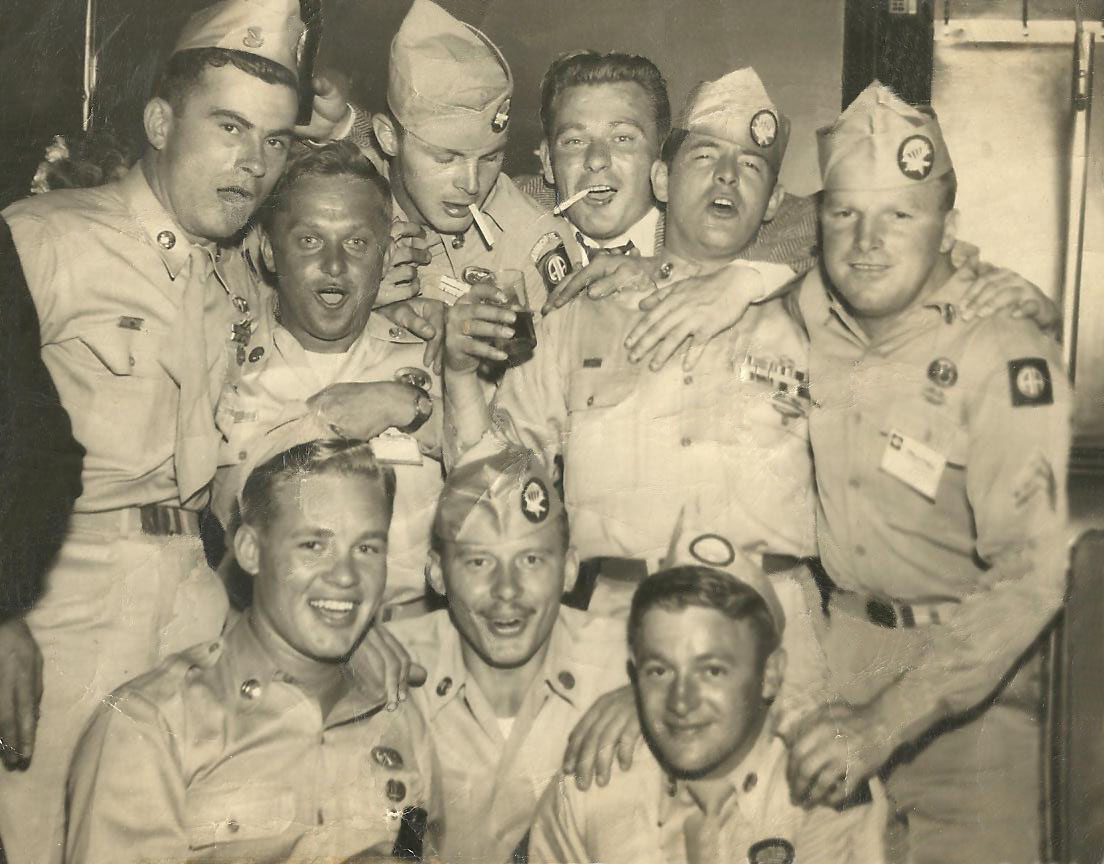
The Unicorn Pub, Loughborough, England, where Joyce and Charlie's wedding reception took place in 1944.
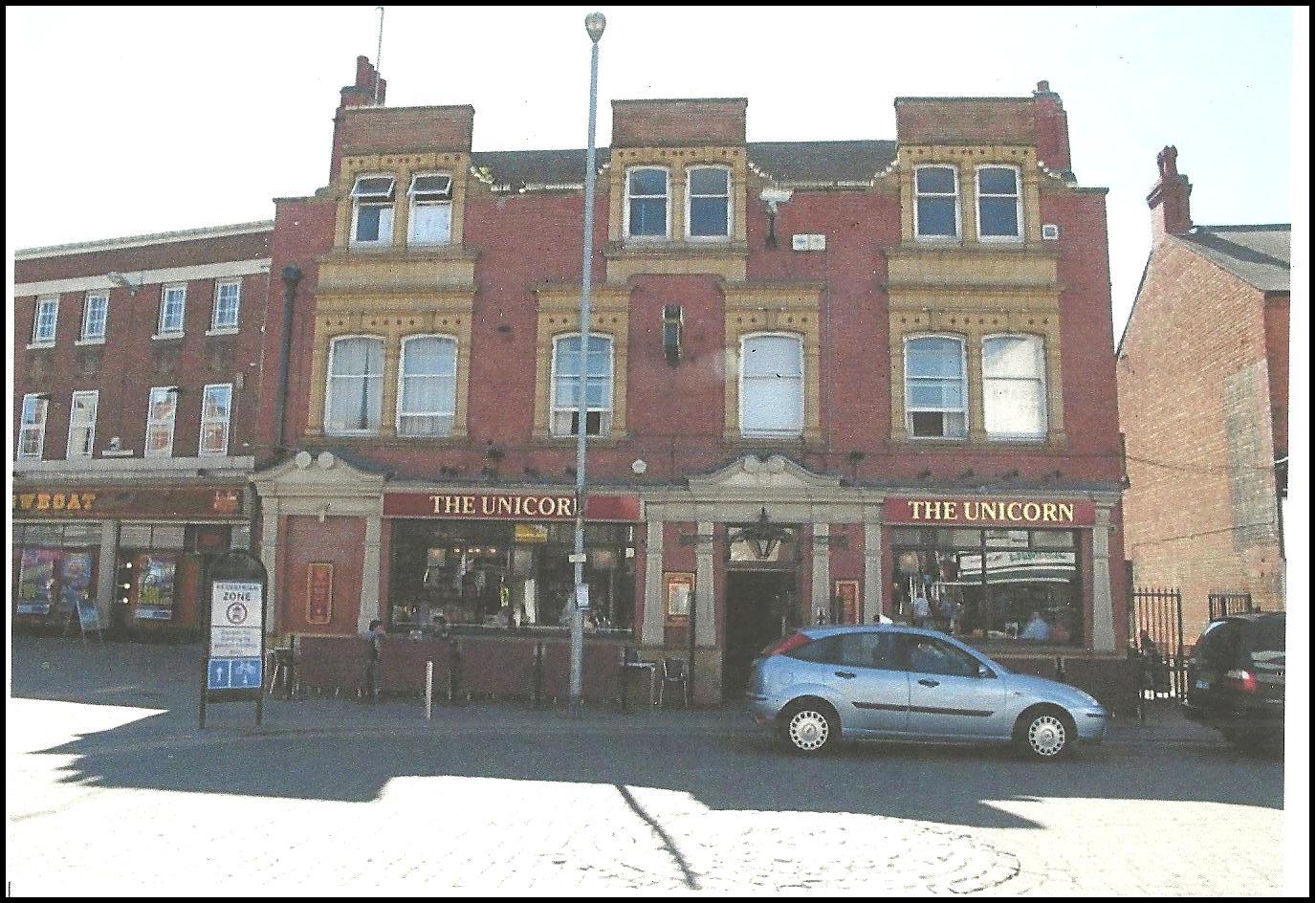
Private Charlie Johnson accepts an 81mm mortar round and loads
another in the tube for Joe Horvath (bottom right). Sicily 1943.
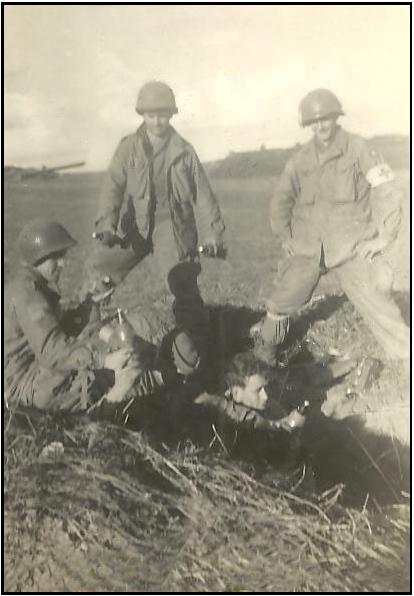
Private Charlie Johnson (foxhole). Sicily 1943.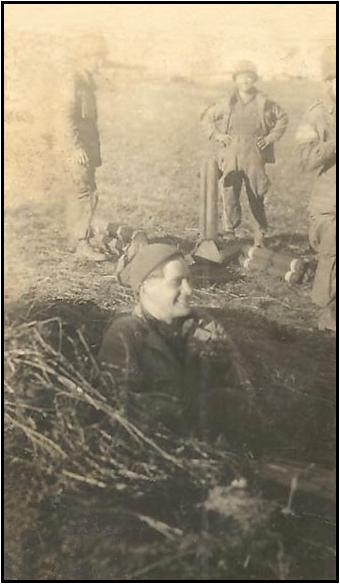
Corporal Horvath's (kneeling) mortar squad. Nijmegen, Holland 1944.
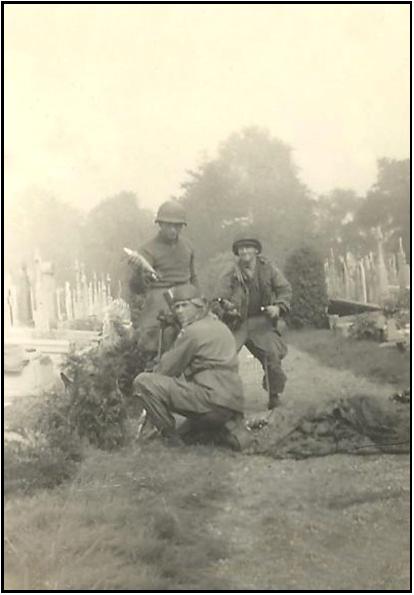
Private Charlie E Johnson. Nijmegen, Holland 1944.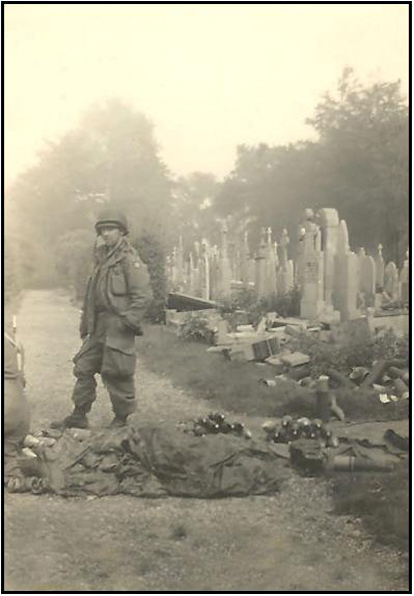
From the cemetery high above the city of Nijmegen, the men of 2nd
Battalions' mortar squad were instrumental in the taking of the
German held city and bridge.
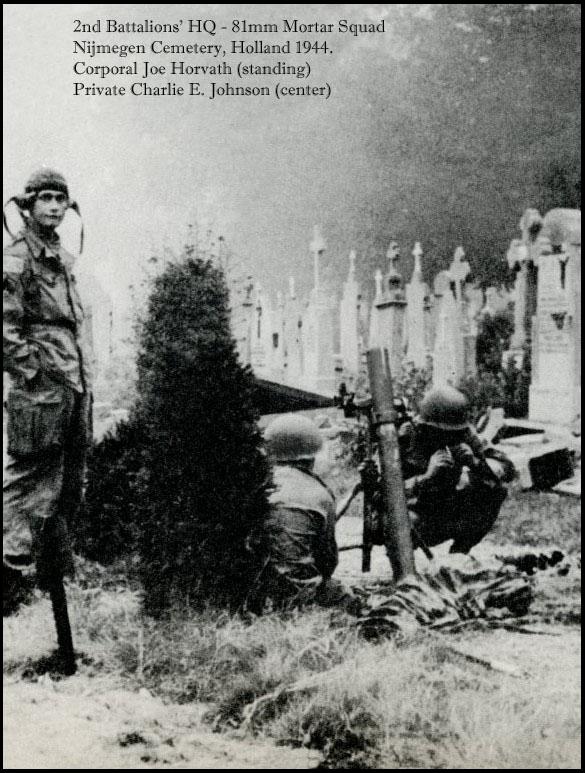
Photo - Saga of the "All American" 1946 by W. Forrest Dawson
The paratroopers in the foxhole below, more than likely were
there to protect the mortar squad. Artillery forward observers
were sometimes protected by several riflemen as well.
Photo - Saga of the "All American" 1946 by W. Forrest Dawson
2HHC mortar squad on their dinner break.
Charlie is seated and Joe Horvath is kneeling.
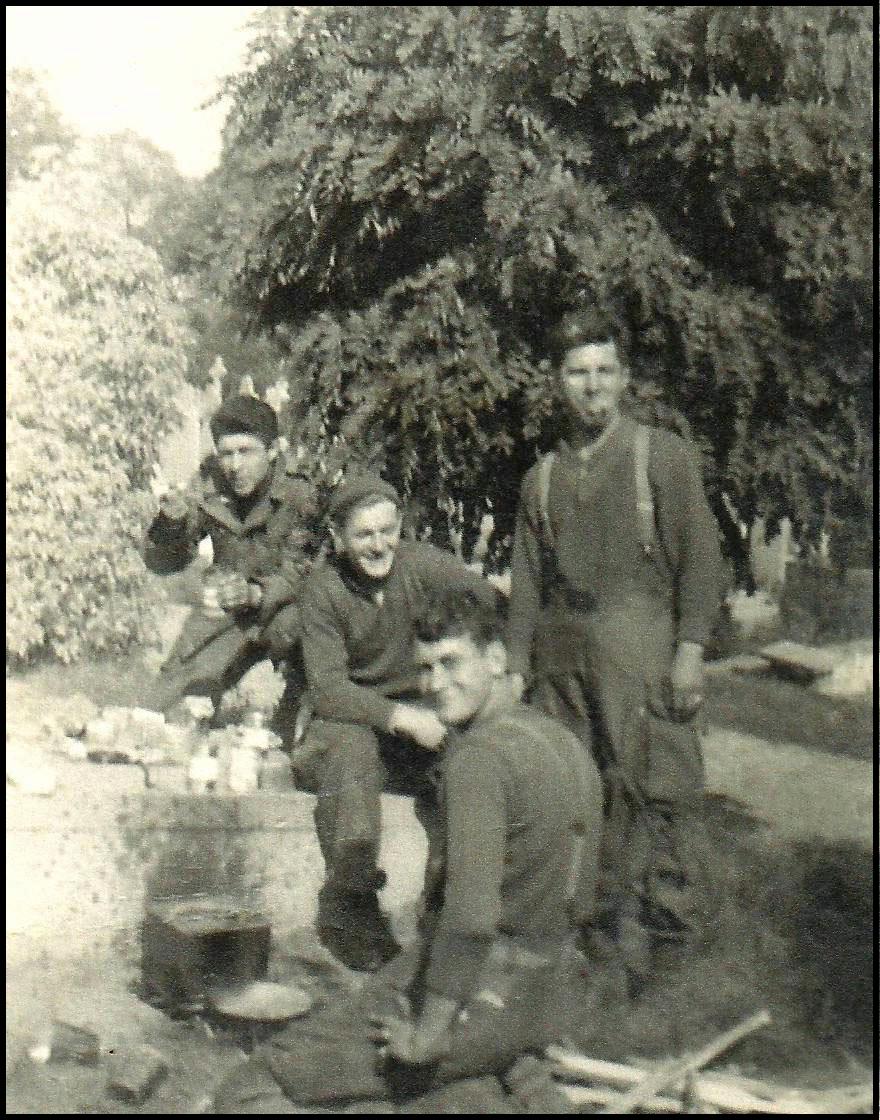
2HHC Paratroopers. If you can identify them contact us.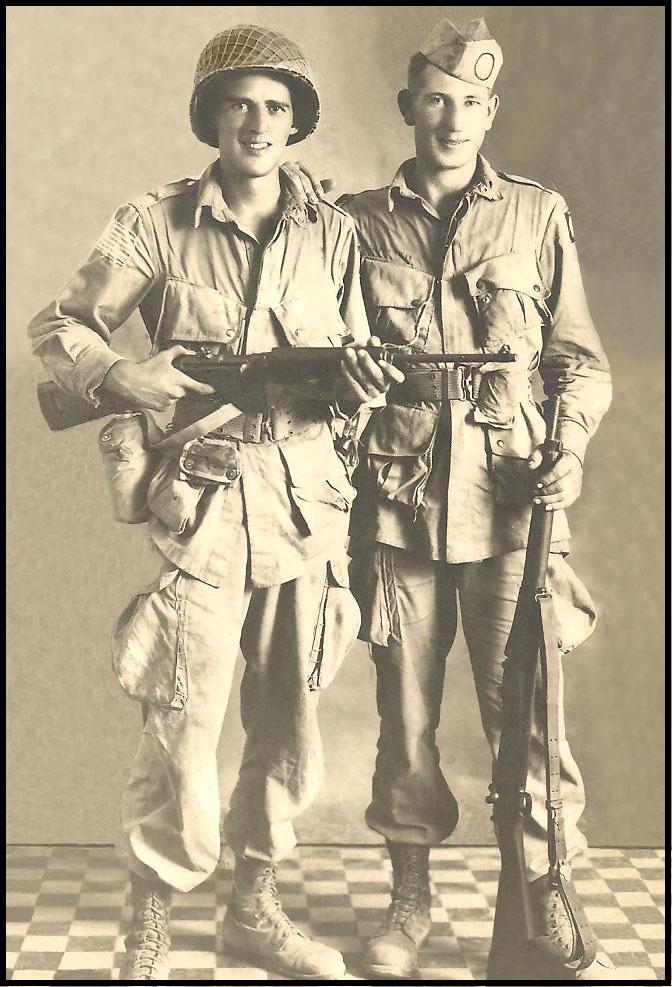
82nd Airborne Division Association in Buffalo, N.Y. (1991 Re-union)
Both men served in the 505th Parachute Infantry Regiment.
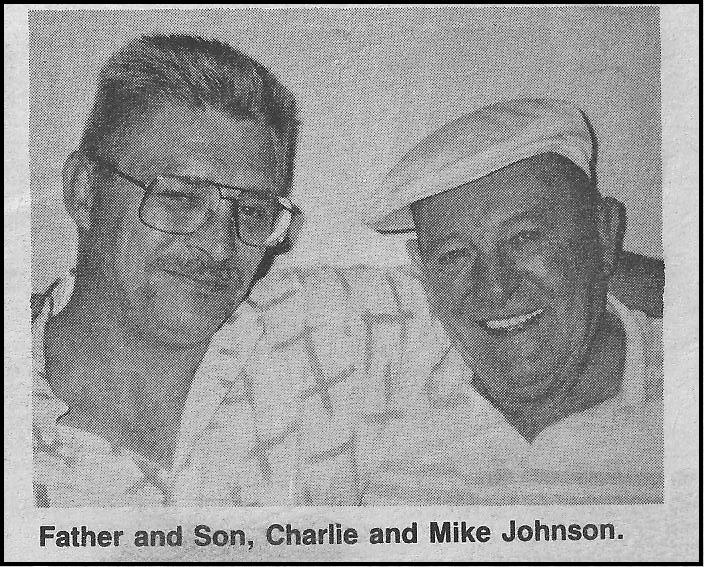
.

|
|